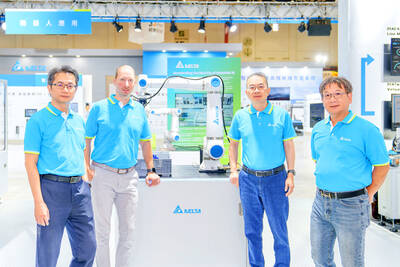Imports from Hynix Semiconductor Inc. and other South Korean chipmakers threaten to hurt Micron Technology Inc, the US International Trade Commission said in a ruling that may lead to import tariffs.
Micron, the world's second-largest maker of computer memory chips and the last one based in the US, complained that its Korean rivals were illegally subsidized by the Korean government.
A final ruling isn't due until the middle of next year.
"[Saturday's] decision sends a strong message that the US will not tolerate unfair trade practices," said Sean Mahoney, a spokesman for the Boise, Idaho, company.
Micron filed its complaint as some chip prices sank earlier this year, falling by as much as a third in mid-June. Infineon Technologies AG, Europe's second-largest chipmaker, in July asked the European Union to investigate whether Hynix and South Korea's Samsung Electronics Co were being illegally subsidized.
The Micron complaint also followed the latest bailout of Hynix, the world's third-largest maker of computer memory chips, by Korea Exchange Bank and other creditors.
The bank is 43 percent government owned.
The IMF said in a recent review of South Korea that government-owned banks should accept that some companies are non-viable and end their support. The IMF took part in a US$60 billion bailout of Korea's finances in 1997.
Samsung, also named in the Micron complaint, is the largest maker of computer memory chips and third-largest maker of mobile phones. Morgan Stanley this week raised the company's profit forecast, citing improved sales of phones.
Micron's case now goes to the US Commerce Department, which will investigate whether billions of dollars in government aid to Hynix and Samsung was illegal, and determine the size of any duties.
A Commerce ruling in Micron's favor would send the case back to the commission for a final determination, not likely before May.
Micron filed its complaint last month. It also followed a failed attempt by Micron to acquire Hynix's assets.
Hynix's board in May had rejected Micron's US$3 billion bid.
The Korea Exchange Bank and other creditors took over the company in June by swapping US$2.4 billion of debt into equity.

SETBACK: Apple’s India iPhone push has been disrupted after Foxconn recalled hundreds of Chinese engineers, amid Beijing’s attempts to curb tech transfers Apple Inc assembly partner Hon Hai Precision Industry Co (鴻海精密), also known internationally as Foxconn Technology Group (富士康科技集團), has recalled about 300 Chinese engineers from a factory in India, the latest setback for the iPhone maker’s push to rapidly expand in the country. The extraction of Chinese workers from the factory of Yuzhan Technology (India) Private Ltd, a Hon Hai component unit, in southern Tamil Nadu state, is the second such move in a few months. The company has started flying in Taiwanese engineers to replace staff leaving, people familiar with the matter said, asking not to be named, as the

The prices of gasoline and diesel at domestic fuel stations are to rise NT$0.1 and NT$0.4 per liter this week respectively, after international crude oil prices rose last week, CPC Corp, Taiwan (台灣中油) and Formosa Petrochemical Corp (台塑石化) announced yesterday. Effective today, gasoline prices at CPC and Formosa stations are to rise to NT$27.3, NT$28.8 and NT$30.8 per liter for 92, 95 and 98-octane unleaded gasoline respectively, the companies said in separate statements. The price of premium diesel is to rise to NT$26.2 per liter at CPC stations and NT$26 at Formosa pumps, they said. The announcements came after international crude oil prices

DOLLAR SIGNS: The central bank rejected claims that the NT dollar had appreciated 10 percentage points more than the yen or the won against the greenback The New Taiwan dollar yesterday fell for a sixth day to its weakest level in three months, driven by equity-related outflows and reactions to an economics official’s exchange rate remarks. The NT dollar slid NT$0.197, or 0.65 percent, to close at NT$30.505 per US dollar, central bank data showed. The local currency has depreciated 1.97 percent so far this month, ranking as the weakest performer among Asian currencies. Dealers attributed the retreat to foreign investors wiring capital gains and dividends abroad after taking profit in local shares. They also pointed to reports that Washington might consider taking equity stakes in chipmakers, including Taiwan Semiconductor

STABLE DEMAND: Delta supplies US clients in the aerospace, defense and machinery segments, and expects second-half sales to be similar to the first half Delta Electronics Inc (台達電) expects its US automation business to remain steady in the second half, with no signs of weakening client demand. With demand from US clients remaining solid, its performance in the second half is expected to be similar to that of the first half, Andy Liu (劉佳容), general manager of the company’s industrial automation business group, said on the sidelines of the Taiwan Automation Intelligence and Robot Show in Taipei on Wednesday. The company earlier reported that revenue from its automation business grew 7 percent year-on-year to NT$27.22 billion (US$889.98 million) in the first half, accounting for 11 percent